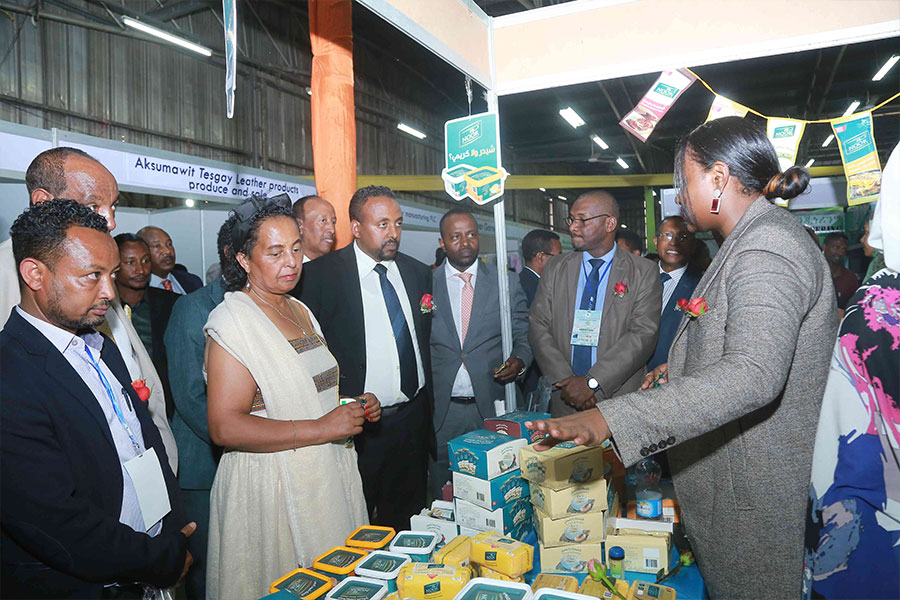
Radar | Feb 25,2023
Jun 24 , 2023
By AKSAH ITALO ( FORTUNE STAFF WRITER )
A bill that subsidizes local producers and levies tariffs on imported goods that have domestic alternatives is put forth by the Ministry of Trade & Regional Integration (MoTRI). Officials hope to calibrate economic liberalisation while maintaining the development of domestic producers and traders with efforts underway to join the African Continental Free Trade Area (AfCFTA).
The absence of trade policy and constant alterations in the law had stakeholders struggle to buildup trust, while underdeveloped logistics infrastructure and weak industry linkages hampered the development of local trade.
According to Destaw Mequanent (PhD), Ministry's policy & strategy research executive, they hope the bill will garner trust between authorities and industry players while integrating the service outlets to facilitate a swift operation. He indicated that the policy will serve as a benchmark for negotiations in international trade treaties guiding duty-free entries and local value chains.
"Improving the efficiency of cross-border transport is essential," he said.
Officials at the Ministry envision digitising customs, tax and licensing authorities will simplify the bureaucratic framework. Destaw recognizes the necessity of a careful balance between trade liberalisation to international business and protecting domestic traders already teetering on the verge of collapse.
"Foresight in policy is critical with the inevitable and gradual opening up of the economy," he said.
Data from the United Nations Conference on Trade & Development (UNCTAD) indicates that more than 90pc of African countries depend on trade that requires little to no value addition. The sale of primary commodities in agriculture, mining and livestock characterizes a significant portion of the continental economy.
The Ministry's Advisor and Former Export Director, Mesfin Abebe, observes that the high volume of informal participants in the country's trade practices has curtailed its growth. He reasoned that in healthy international markets, a rise in production usually results in decreased prices; in contrast, Ethiopian trade is marked by sustained price increments regardless of production.
The Advisor believes that the new policy will provide fair, transparent, competitive trade for local producers while enhancing appeal from foreign buyers.
Several experts have cited continental free trade as holding the promise of growth and greater trade volume for the continent, with many of the countries beginning to trade two years ago.
A study by the World Bank estimates that 30 million Africans will be lifted out of poverty in 2035 and wages will be boosted by 10pc if AfCFTA is implemented properly. Africa is home to 44 million small businesses accounting for 80pc of the continent's workforce, while Intra-African export potential amounts to 22 billion dollars.
Only 14pc of the continent’s exports are destined for other African countries, most of which are primary commodities. Despite ongoing efforts to diversify sources of growth and trade, more than 80pc of countries on the continent remain highly commodity-dependent, according to African Export & Import Bank (Exim Bank).
Addis Chamber of Commerce & Sectoral Association, with over 17,000 members from exporters, importers, and Small and Medium Enterprises(SMEs), has been voicing the necessity of formalizing the national trade laws, practices and regulations to create a better image of the country in international trade for several years.
Seyoum Chane, policy, research & advocacy manager at the Association, disclosed that the country had lagged in trade promotion, where most valuable commodities have remained internationally unknown. He suggested an institution promoting commodities internationally should be formulated through the policy, with a clear articulation of why the country has not been able to become a signatory to some of the international trade organizations.
"Remedies should be identified," he told Fortune.
The mandates of trade authorities regarding duty-free entries and management of transit hurdles become priorities in future trade policy, according to Seyoum.
The bill is expected to serve as a guiding principle for international trade if realised. However, a meticulous calibration of potential pitfalls is recommended, according to legal experts believe.
Yehualashet Tamiru, a corporate lawyer, applauded several elements of the trade policy as he believes it can showcase a formalized legal trade framework in bilateral and multilateral negotiations.
He agrees with the importance of a continental free trade area, citing that the country should change from commodity-driven transactions to value-added transactions, which can generate higher returns.
"The capacities of the private sector should be given an emphasis to play a significant role in manufacturing," he told Fortune.
PUBLISHED ON
Jun 24,2023 [ VOL
24 , NO
1208]

Radar | Feb 25,2023

Fortune News | Oct 13,2024

Commentaries | Sep 13,2025

Viewpoints | Feb 17,2024

Editorial | Oct 03,2020

Commentaries | Mar 11,2023

Fortune News | Dec 17,2022

Radar | Aug 03,2019

Fortune News | May 20,2023

Fortune News | Feb 09,2019

Dec 22 , 2024 . By TIZITA SHEWAFERAW
Charged with transforming colossal state-owned enterprises into modern and competitiv...

Aug 18 , 2024 . By AKSAH ITALO
Although predictable Yonas Zerihun's job in the ride-hailing service is not immune to...

Jul 28 , 2024 . By TIZITA SHEWAFERAW
Unhabitual, perhaps too many, Samuel Gebreyohannes, 38, used to occasionally enjoy a couple of beers at breakfast. However, he recently swit...

Jul 13 , 2024 . By AKSAH ITALO
Investors who rely on tractors, trucks, and field vehicles for commuting, transporting commodities, and f...

Nov 1 , 2025
The National Bank of Ethiopia (NBE) issued a statement two weeks ago that appeared to...

Oct 25 , 2025
The regulatory machinery is on overdrive. In only two years, no fewer than 35 new pro...

Oct 18 , 2025
The political establishment, notably the ruling party and its top brass, has become p...

Oct 11 , 2025
Ladislas Farago, a roving Associated Press (AP) correspondent, arrived in Ethiopia in...